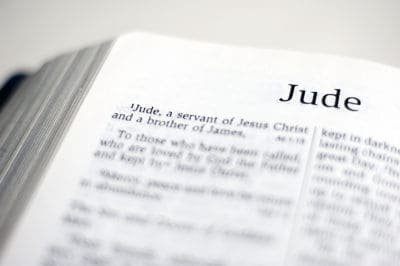I was recently asked by a student about the book by Michael S. Heiser, The Unseen Realm. I was not familiar with either the author or the book, so I got the Kindle edition.
It did not take very long to discover a critical problem at the foundation of his approach that undermines his whole system. He says,
Was my loyalty to the text or to Christian tradition? Did I really have to choose between the two? I wasn’t sure, but I knew that what I was reading in Psalm 82, taken at face value, simply didn’t fit the theological patterns I had always been taught.
(page 12)
Now, what does it mean when he says “face value”? Does “face value” mean what the text says apart from any interpretation? This cannot be the case for him since he says the “face value” did not “fit the theological patterns I had always been taught.” If he surmised that the face value did not fit, this can only be because he had understood the text in a certain way that caused this conflict in his mind. But, to take the text in a certain way is not “face value.” It is the meaning that he got from the text when he understood it, interpreted it, in a certain way. This already reveals a hermeneutic philosophy that predisposed him to arrive at a certain conclusion. Whether this initial interpretation was wrong or right is not at present the issue. What is at issue is that it reveals his latent hermeneutic philosophy.
He goes on to say,
Clarity eventually prevailed. Psalm 82 became a focal point of my doctoral dissertation, which also examined the nature of Israelite monotheism and how the biblical writers really thought about the unseen spiritual realm.
(page 12)
The question that this raises is, How does he come to know how the biblical writers would have understood the spiritual realm? The only access, if he in fact is loyal to the text, is the text itself. But, there is no place in the text that specifically instructs the reader on how the biblical writers would have understood the spiritual realm. So, to what sources would he have gone to discover these facts? If he goes to the Bible to discover how they would have understood the text, then his claim actually begs the question. He would have to have an always-already-present hermeneutic grid, that is a hermeneutic philosophy, in order to discover the hermeneutic grid in the text. To claim that he went to the text to discover how they would have understood the spiritual realm is therefore circular. I go to the text to discover how they would have understood the spiritual realm, I interpret the text in such a way that I grasp how they would have understood the spiritual realm, then I use these conclusions to show how they would have understood the spiritual realm. But, his conclusions about how they would have understood the spiritual realm are not from the text, but from his interpretation of the text, an interpretation which he then uses as the grid through which to interpret the text.
His hermeneutic philosophy is flawed; that is, it is self-referentially incoherent. Consequently any conclusions about what the text says derive from his flawed hermeneutic. How, then, does one know that one’s hermeneutic philosophy is good or bad? Is it then possible to have an objective understanding of the meaning of the text? Of course it is possible both to discover one’s own hermeneutic philosophy and to have an objective understanding of the meaning of the text. But that involves a philosophical and hermeneutical study into which we do not have the time to delve.
Heiser says that we need to understand the culture in which these statements are made, and I understand and agree with this fact, but one must also interpret what one reads about the culture. All we have are things and texts that remain, and all of these are subject to interpretation. If one’s interpretive methodology is flawed, then his interpretations of these other matters are as flawed. Additionally, there are no extra-biblical Hebrew documents to which we can appeal for clarification, at least not until you get to the writings of the Essenes. But these are much too late to help.
I completely disagree with the conclusion about the Divine Council. The word ‘Elohim’ is plural, and there are many times that it is used as the name for God and has associated plural and singular terms. It is similar to German, which always capitalizes nouns, so the fact that the German noun is capitalized does not justify concluding that it is some kind of proper name. Gott is capitalized because it is a noun, not because it necessarily refers to God.
Just because a word is plural does not mean that it is a reference to plurality. In Gen. 4:10 the text states, “The voice of your brother’s bloods [d emēy] is crying out from the ground.” The plural “bloods” is used here to indicate the severity of the blow. His blood was splattered around. Blood being splattered is not the same as different bloods. In John 1:13 the text says, “who were born, not of bloods . . .” The term here is plural (haimatōn). The use of the plural does not necessarily mean a plurality. So, basing his conclusions on plurality is faulty.
The term in Psalm 82 does not refer to other gods, nor to the elders of Israel. Every leader of every nation is put into power by God, and should be a representative of God to the ruler’s people. They are referred to as gods because they are supposed to be the representatives of God. God referred to the Judges of Israel as Elohim because they were put in Israel as representatives of God’s justice, not because they were gods. This is precisely the way Jesus presents this statement in Jn. 10:34: “Jesus answered them, ‘Has it not been written in your law, “I said you are gods”?’ If he called them gods, to whom the word of God came (and the Scripture cannot be broken), do you say of Him, whom the Father sanctified and sent into the world, “You are blaspheming,” because I said, “I am the Son of God”?’” Jesus is referring to at least two passages, one in the Law, Ex. 22:8, and one in Psalm 82.
In Ex. 22:8, the text states, “If a thief is not caught, then the owner of the house shall appear before the gods (elohim, often translated ‘judges’) to determine whether he laid his hands on his neighbor’s property.” Why are the judges of Israel referred to as gods? Because they are supposed to be the representatives of God’s justice.
The other passage to which Jesus is referring is Ps. 82:6–8 “I said, ‘You are gods, and all of you are the sons of the Most High. Nevertheless you will die like men and fall like any one of the princes. Arise, O God, judge the earth. For it is You who possesses all the nations.” Will the gods of a divine council die? These are men, rulers of all nations, who were supposed to be the representatives of God in all nations. That is why the Psalmist says, “For it is You who possess all the nations.” Notice also that the text states, “Arise, O God, judge the earth.” It does not say, “judge the gods.” Are the gods of the divine council on the earth? These gods are men put in their various places of power who will be judged because they have not been the representatives of God as they were appointed to be. The same will happen to the judges of Israel.
In John 10 Jesus is saying, just like the judges of Israel are called gods if they executed God’s justice rightly, and just as the rulers of nations were recognized as representatives of God if they did God’s will and demonstrated His character by their actions and decisions, so why do the Pharisees say Jesus is blaspheming when He claims to be the Son of God if His works show forth the character of God. Just as the works of rulers of nations and the judges of Israel should be evaluated on the basis of their works, the Pharisees should have evaluated Jesus’ claims on the basis of His works. His works demonstrate that He is the Son of God.
There can be only one God. If there are two gods, they must differ by some difference. But they cannot differ by being qua being or by attributes because these are the very characteristics of God. But, two gods who do not differ are not two gods, but one God. So, if there cannot be more than one God, then what does the term elohim mean when used in Psalm 82? Are we to think there are some intermediate beings between God and angels? If they can’t be actual gods, and they cannot be the angels, who are never referred to by the word elohim, or some intermediate beings between angels and God, which was a view espoused by heretical groups in the time of the early Christian church, such as certain Agnostic groups and Marcionites (you also see the divine council in Enuma Elish, which refers to the assembly or council of gods), they must be men, who are in fact referred to by the words elohim OT and theoi NT.
I do not in any way want to imply nor do I believe that Heiser is not a committed Christian; as he says, committed to the orthodox Christian doctrines of the Trinity, the Deity of Christ, salvation by grace through faith, etc. He is without doubt a committed academic and scholar who is seeking to understand the meaning of the text. My issue is not with him as a person, a scholar, or a Christian. My issue is with his hermeneutic philosophy. His hermeneutic philosophy is self-referentially incoherent. It begs the question and it has led to conclusions that cannot be supported by his own interpretations. One cannot use one’s interpretations to prove that one’s interpretations are correct.
Why do biblical academics come to such bad conclusions? Because they don’t do philosophy. If they don’t do philosophy, they end up imbibing bad philosophy, which leads to bad methodologies, which lead to bad conclusions.
There is a statement, however, that set off additional alarm. Heiser says, “But in reality, even though I believe I was providentially prepared for the academic task I faced, there were times in the process when the best description I can give is that I was led to answers.” How was he “led”? Who was doing the leading? I am not saying that he believed he was being led by the Holy Spirit, but would the Holy Spirit lead someone on the basis of a flawed hermeneutic? This kind of statement should sound the alarm for anyone reading this book.
Heiser has a bad hermeneutical methodology because he has a bad hermeneutic philosophy. This bad philosophy has led him to bad conclusions. There have always been Christians who have tried to come up with some unique and revolutionary interpretations. Heiser is not the first to come up with this notion of a council of gods. You can see this in Gnosticism, and Marcionism, and in other adaptations of basic Christian doctrines. I’m sure he won’t be the last.

Download Your FREE eBook!
- Reading Books and Listening to Talks is Not Enough
- Not All Apologetics Methods Are Created Equally
- A Degree is More Than a Piece of Paper










